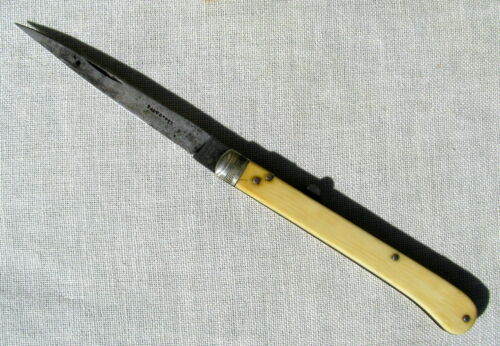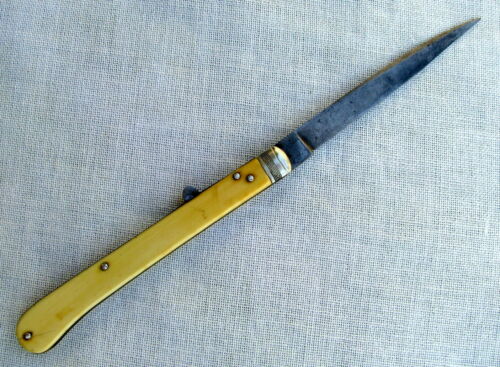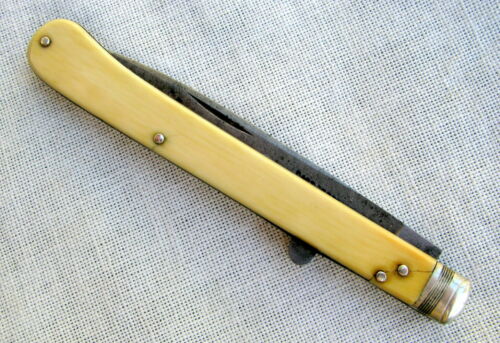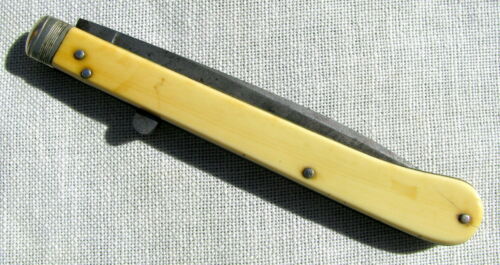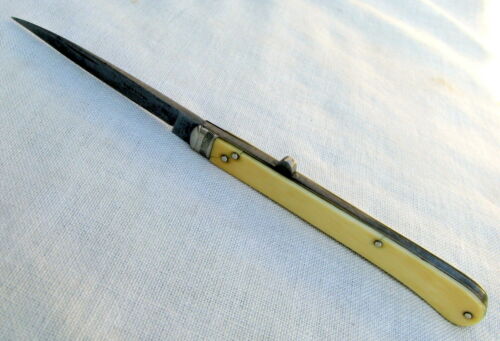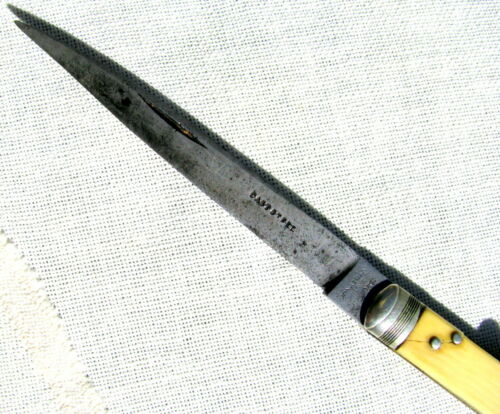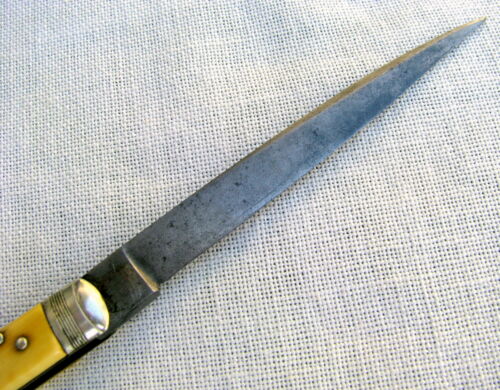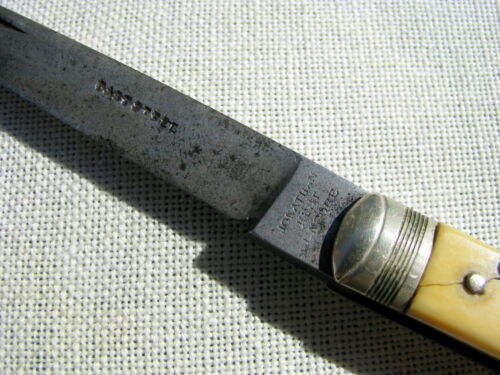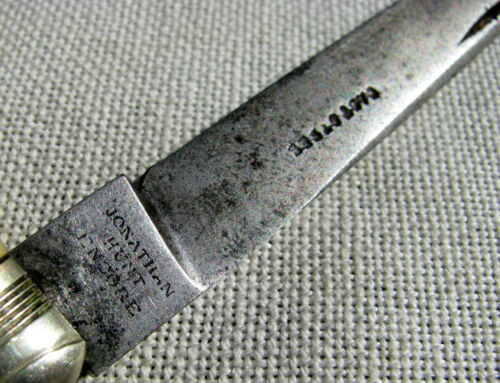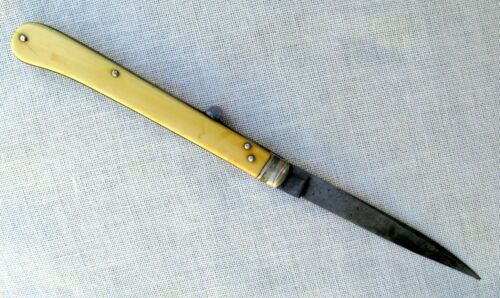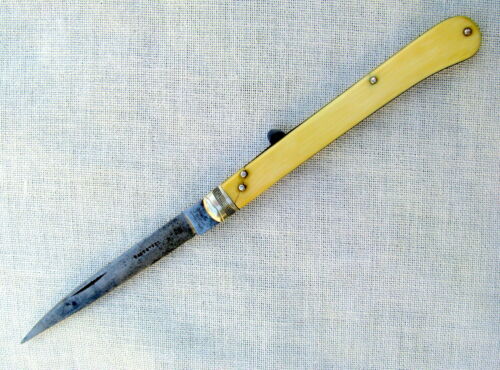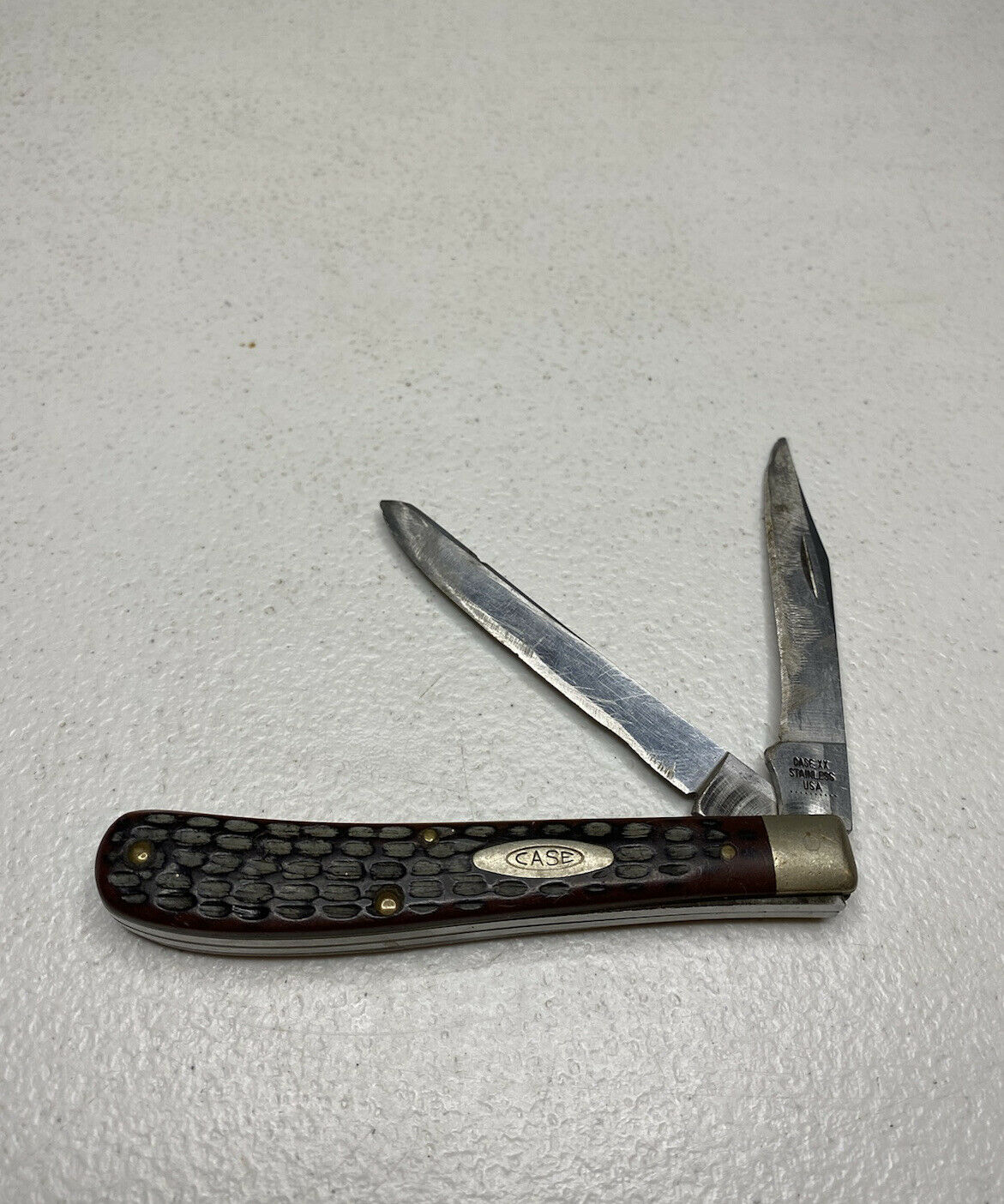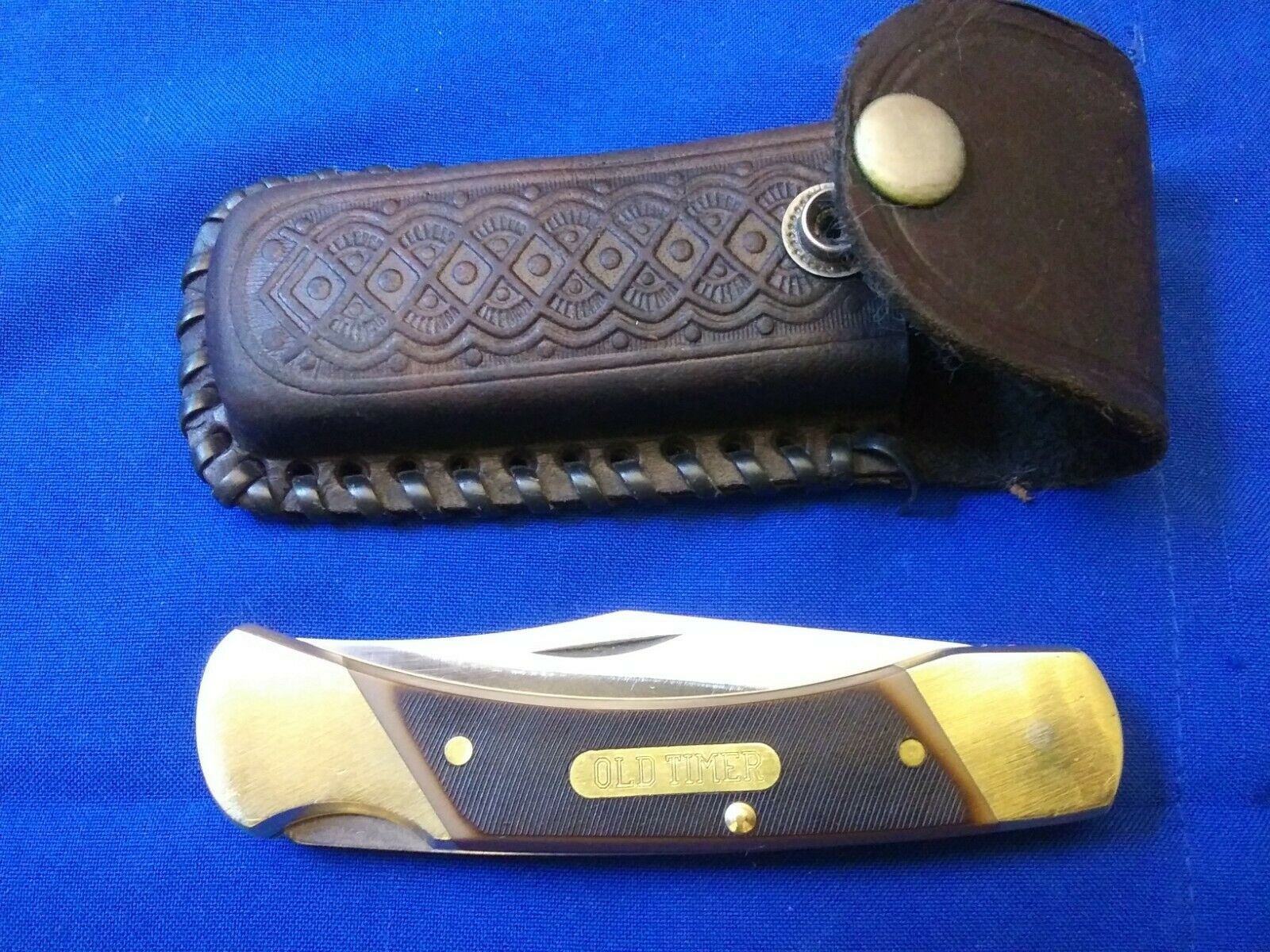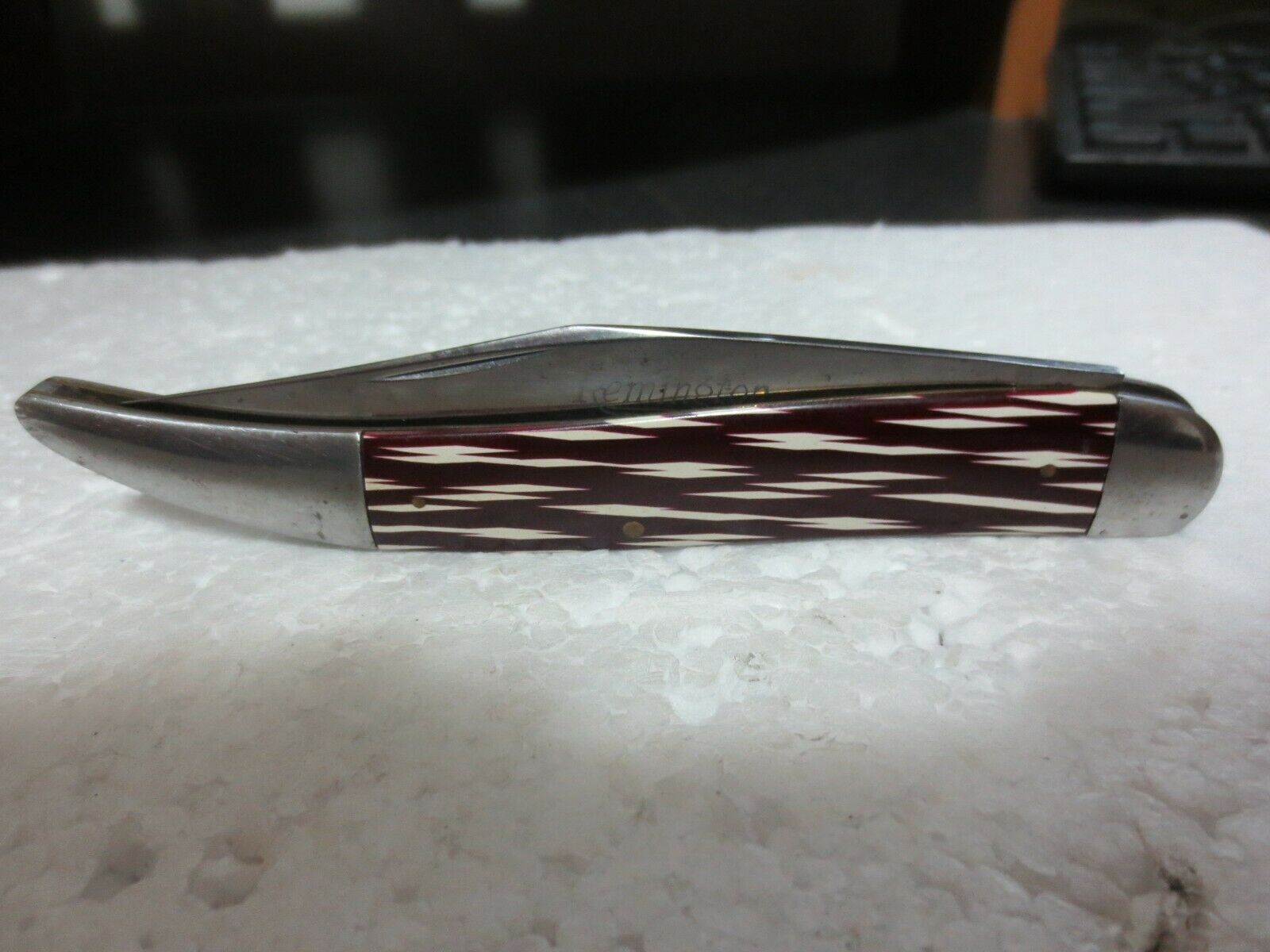-40%
FINE & RARE SIZE c.1829 -1837 SHEFFIELD FOLDING LOCK BACK DIRK BY JONATHAN HUNT
$ 1042.8
- Description
- Size Guide
Description
FINE & RARE SIZE SHEFFIELD FOLDING LOCK BACK DIRK BY JONATHAN HUNT c.1829 - 1837FINE & RARE SIZE SHEFFIELD FOLDING LOCK BACK DIRK BY JONATHAN HUNT c.1829 - 1837
RARE PERIOD SHEFFIELD SMALL POCKET
FOLDING LOCK BACK ~ CAST STEEL BLADE DIRK
SELF DEFENSE WEAPON ~ CIRCA 1829-1837
These early folding dirk knives were created to be used only as self-defense weapons. They fall into the early category of edged weapons made for personal self-defense purposes; and thus, have the accompanying Mano-a-Mano romance and history associated with this early period of American history. They are the Gentleman's counterpart to the fixed blade Bowie and Dirk knife; but are many times rarer than their fixed blade counterparts.
This rare & early 19th Century Folding lock back Dirk weapon is by a scarce & early high quality Sheffield cutler Jonathan Hunt. Not much is known about Jonathan Hunt or his Cutlery. Knives made by Jonathan Hunt are exceedingly rare, and this is the only Sheffield knife of any kind I have seen with his Maker mark. He has a small mention in Goins Cutlery Encyclopedia as a Company that manufactured Bowie type knives, among other cutlery from 1829 – 1837. His firm was located on Division Street in Sheffield. This piece is Hot Stamped “JONATHAN HUNT” and “ENCORE” in two lines on the ricasso.
Sheffield Bowies, Folding Bowies, Daggers, Dirks and Folding Dirks are well known examples of exquisite, completely handmade Sheffield Self Defense weapons that became popular on the American Frontier and in cities during the English W crown R period (1830 -1837). Some cutlery from this early period had a W crown R hot stamped on the ricasso; some with just a crown. The W stood for King William, and the R stood for Regency. This mark was utilized by some English Cutlery Makers to suggest the firm had a Royal Warrant. However, only 3 Sheffield Cutlery firms were granted Warrants to make cutlery for the Royal family. Only about 10% of cutlery from this period bear a Regency Mark of King William, who ruled England from 1830 to 1837; and most of these cutlery items did not have Royal Warrants. This piece is from this same period as noted in Goines book This Sheffield Bowie knife maker was in business from 1829 to 1837, the reign of King William IV. In the 1830’s, almost all folding and fixed blade Dirks and Bowies were imported, almost exclusively from Sheffield, Old England for the burgeoning American Market; and this piece was intended for a well-to-do gentleman to use as a self-defense primary or back up weapon. During the early 19th century there was little law and order, and it was "every man for himself". Men were often at risk of being waylaid by thugs, ner' do goods, thieves, robbers, and bandits; 1830’s Gentlemen would typically carry a brace (2) of single shot percussion pistols which were prone to misfiring. Thus, gentlemen would also typically carry a folding dirk knife in their pocket or vest, or sometimes a less expensive fixed blade dirk or a Bowie knife as a side arm on their belt as a backup self-defense weapon. These early folding dirk knives were made only as a self-defense weapon for personal protection, and were completely hand forged, hand ground and hand fitted, and hand polished using only the simplest of hand tools. The American revolver was not invented until 1836 by Samuel Colt. This Patterson model revolver and was prohibitively expensive at the time, and revolvers were not in general use in American until the Colt Baby Dragoon pocket model was introduced in 1848; followed shortly by the popular Model 1849.
This piece has several distinctive features generic to this period, i.e., a pistol shaped hilt, a “triangular” shaped Master blade, line engraved bolsters with no crossguard, the early style round back spring release, and the hot stamp “CAST STEEL” on the blade flat.
SEE AN OVERVIEW OF THIS RARE STEEL BELOW.
This style, shape and size of this Dirk is what is typical of 1820's Folding Dirks, and this pattern continued into the 1830’s; even when lead filled stamped German Silver fittings became immensely popular on Sheffield made dirks, daggers and Bowies. Some Gentlemen preferred no cross guard, as they were bulky and can get caught up in a vest or pants pocket when attempting to quickly retrieve the weapon if needed. Most dirks of this pattern in the 1820’s did not have a lock back. This piece is the 1820’s pattern but is an exceedingly rare small dirk compared to most from this period; yet has the lock back feature. Not all Sheffield Folding Dirks were a lock back design such as this one, which are rarer, more desirable, and were more expensive to manufacture. The lock back feature is designed for safety; to prevent the blade from closing on the fingers while gripping the hilt during a knife fight. Lock back dirks with the 2 piece back springs required special tempering of the shorter back spring & special hand fitting of the delicate locking mechanism. The 2 piece back springs on lock back dirks were only about 2/3 the length of one piece back spring dirks; thus, adding to the weakness of the Main spring. The lower 2/3 of the spring acts as the only spring for the Master blade. The top 1/3 portion of the "back spring" acts as the lever & locking mechanism of the Master blade and is not tempered to have any spring tension. Many of these with "2/3 length" back springs have wear from actual use of nearly 2 centuries, and typically have less snap compared to the one piece back springs that are much longer, hand tempered differently, and almost always have a strong snap. This dirk locks tightly in the open position and has a very strong spring snap when closing. Note it is no advised to snap any old blade into the hilt, as they can sometimes bottom out or hit the liners and damage the blade unnecessarily. Note that an 1830's dirk is 10 times rarer than an 1840's or 1850's folding lock back dirk as most were carried daily and lived a long, hard life and saw a decade or two of daily use before the later 1840's or 1850's lock back dirks were manufactured. This accounts for most of these old folders having their delicate 2-piece, 2/3 length Master blade springs that are sprung, worn out, or with light or no snap at all. This is one reason why early, pre-1837 knives are so rare; and are exceptionally rare in a pre-1837 small size lockback that has excellent locking and snap. Some Folding lock back dirk weapons were carried in the Mexican American and Civil Wars by Military Officers, and favored by Sporting Gents, Gamblers and Gentlemen of means after carrying firearms was outlawed in the 1800’s and well into the 20th century.
Overall, this rare small weapon is only 7 5/8" long open, 4 ¼” long closed, with a 3 5/8” triangular shaped pointy single edged dirk blade, weighing only 1.3 ounces or 39 grams. This was created to be easily hidden and retrieved; yet would be a formidable and deadly self-defense weapon. Its diminutive size makes this piece even rarer. The blade ricasso is Hot Stamped “JONATHAN HUNT” and “ENCORE”. It can be assumed ENCORE was his trademark. The blade has a full profile and has been properly sharpened over time, but not in a very long time. When you run you finger over the sharpened edge, there are no nicks to the blade. The Master blade shows even medium to dark naturally occurring patina aging with a couple areas of slightly darker coloration on both sides of the blade edge; mostly spidering near the nail nick visible with a jeweler’s loupe under magnification. This naturally occurring aging is expected and normal for a dirk knife that is 185+ years old; and is in lightly used and carried and remains in excellent condition. The liners are brass and the line engraved bolsters are lead filled German silver. The knife is held together with 4 good sized German silver pins. All natural material shrinks over time, and can create hairline cracks at the pins from naturally occurring shrinkage over 185+ years. The frontside has a hairline crack running through the 2 adjacent top pins; one is the pivot pin for the locking lever where pressure is applied, and the other is a scale pin. The back side pommel pin has a thin hairline crack that goes through the pin to the edge.
This Early Sheffield Folding Lock back Dirk knife by a very rare Maker would make a handsome display piece in any knife, dirk, dagger, Folder, Bowie, edged weapon, Mexican American or Civil War Military Officer's accouterments, Old West, Western Americana, Gambling or Sporting Gents collection. Many collectors have never seen a W crown R period lock back dirk, much less had an opportunity to own an eye appealing, early self-defense weapon in fine condition with great locking and blade snap. This handsome piece has a lot of eye appeal, is very early. Bill Williamson, the Well Known "Grandfather" of Bowie knife collecting, wrote that in the burgeoning United States of the 1830's, 95% of all early knives imported into America were from Sheffield. Given this Sheffield / American connection, the heritage and legacy of these folding dirk weapons are many times rarer and more desirable than their fixed blade counterparts. Considering their extreme age, any pre-1837 lock back self-defense weapon is a rarity in any condition. Provenance: purchased many years ago from a well-known, High end Knife Dealer and collector from London.
Cast Steel Overview
This one-of-a-kind Early 1830's Sheffield Folding lock back dirk’s blade is made with Sheffield Hand Cast Steel. Cast Steel (crucible steel) was invented in Sheffield in 1740's for making clock springs. By the 1760's it was being used for fine quality cutlery blades, and especially for pocketknife springs which could now be made smaller and more reliable due to the malleable and superior tempering qualities. The skill of making Cast Steel was complex and took years to learn. It took over a week just to make blister steel used in making crucible steel; and Sheffield steel makers used top quality Swedish Iron religiously. Pot makers made clay for the crucibles by treading clay for hours with their bare feet; and had to be uniform in thickness as thin areas will cool quicker and create internal stress points that lead to steel fracturing. About 60 pounds of wrought Iron and crushed charcoal were mixed in crucibles that were heated in a furnace in the ground. The Furnace men could read the carbon content by simply looking at the crystalline fracture of an ingot. There were about 8 different carbon content steels used in Sheffield for different types of Cutlery: from about .08% for table blades to 1.5% for razors. The cellar lads helped below the furnaces and fetched beer from the pubs outside the factory gates as one of the most important raw material for the process. After several days in the furnace, the Iron became saturated with carbon, the crucible would be pulled out of the furnace fire hole by the Puller-out. Cast steel is less fluid, has a higher melting point, greater shrinkage, and is more difficult to pour than molten Iron. The crucible (about 27 lbs.), molten steel contents (56 lbs.) and tongs (19 lbs.) weigh about 100 lbs. The Head Melter (Teemer) would pour the molten steel into a 3" square x 30" crucible without allowing the metal to touch the sides where it would instantly set and create flaws in the ingot. Sheffield Cutlers use of Shear Steel for centuries is legendary. Cast Steel was more uniform as it did not contain the slag as in Shear Steel, was more uniform, and kept a finer edge. Handmade Cast Steel was extremely laborious and expensive to create and used for the best quality Sheffield Cutlery. Most Makers would hot stamp their hand forged blades CAST STEEL to denote the superior quality & temper of the steel. In the 1800s, some crucible steel makers specialized in making cutlery steel. IXL bought crucible cutlery steel from Sheffield steel maker Thomas Firth, but Thomas Turner made their own at Suffolk Works, as did Joseph Rodgers in the late 1800's. Cast steel was rarely, but still created by hand until 1907 when the electric furnace made handmade cast steel obsolete, making 25 tons per melt with better control of the alloy and carbon content vs 60-pound handmade ingots.
PAYMENT
~~~~~~~~~~~~~~~~~~~~~~~~~~~~
PAYPAL & ELECTRONIC FUNDS TRANSFER, e-CHECKS & ALL MAJOR CREDIT & DEBIT CARDS, APPLE PAY, GOOGLE PAY AND ALL OTHER PAYMENT METHODS APROVED BUY EBAY.
~~~~~~~~~~~~~~~~~~~~~~~~~~~~~~
SHIPPING
~~~~~~~~~~~~~~~~~~~~~~~~~~~~~~
FREE SHIPPING & HANDLING FOR DOMESTIC BUYERS & TO THE EBAY U.S.A. INTERNATIONAL SHIPPING CENTER.
FOR USA PURCHASES, SHIPPING, HANDLING & DELIVERY IS FREE VIA U.S.P.S. FIRST CLASS MAIL (UP TO 16 OZ.) OR U.S.P.S. PRIORITY MAIL USING ONLINE SHIPPING LABELS WITH DELIVERY CONFIRMATION. INTERNATIONAL BUYERS WILL HAVE THEIR ITEM SHIPPED TO EBAY'S U.S. INTERNATIONAL SHIPPING CENTER; AND EBAY WILL INFORM THE BUYER OF THE ADDITIONAL SHIPPING / CUSTOMS / TARIFFS, VALUE ADDED OR ANY OTHER FEES, LEVIES OR TAXES. All items are shipped within 1 to 2 business days with email confirmation. Exceptions include holidays, power outages, and evacuations. Items shipped to a California address require CA State sales tax of 8.625% or a valid CA seller's permit # or the item cannot be shipped. All items are shipped using PayPal or eBay's online shipping service and are covered for non-delivery by their shipping service with free tracking and delivery confirmation. BUYER AGREES TO EBAYS RULE THAT SIGNATURE CONFIRMATIN IS REQUIRED FOR ALL ITEMS OVER 0, AND OTHER SHIPPING CHARGES SUCH AS U.S.P.S. EXPRESS MAIL MUST BE REQUESTED AND PAID FOR ANY OPTIONS WITH PURCHASE, AND WILL MAKE DELIVERY ARRANGEMENTS FOR ITEMS REQUIRING A SIGNATURE AS PROOF OF RECEIPT.
~~~~~~~~~~~~~~~~~~~~~~~~~~~~~~
TERMS & CONDITIONS
~~~~~~~~~~~~~~~~~~~~~~~~~~~~~~
ALL BUYERS MUST CONFIRM HIGH BIDDER STATUS AND MUST MAKE PAYMENT WITHIN 3 BUSINESS DAYS OR 5 CALENDAR DAYS AFTER LISTING ENDS; otherwise, Seller reserves the right to cancel the sale and report you to eBay as a non-paying bidder. Seller reserves the right to relist an item if eBay's system goes down within 24 hours of the end of the auction. Bids will not be accepted from anyone that is not a registered eBay user. Seller reserves the right to cancel bids from any eBay buyer who Seller determines has an unsatisfactory eBay transaction history, has changed their eBay user Identity in the previous 30 days, whose eBay rating is listed as private.
~~~~~~~~~~~~~~~~~~~~~~~~~~~~~~
SELLER'S RETURN POLICY
~~~~~~~~~~~~~~~~~~~~~~~~~~~~~~
eBay customers are protected when they are an eligible buyer, complete a purchase of an eligible item on a eBay's website, and purchase the item on eBay by using the "Pay Now" option, third-party checkout or an eBay invoice in one lump payment with a PayPal approved financial business. Buyers must keep their PayPal account in good standing. Buyers must show good faith conduct with the seller. Improper good faith conduct can include, but is not limited to, any means by which a buyer can attempt to unjustly benefit from the Seller's Terms & conditions or eBay's Buyer Protection plan. Moreover, good faith conduct does not include buyer's remorse, regardless of the reason. Returns will not be accepted such as changed my mind, found a better price, just didn't like it, Ordered by mistake, Arrived too late, etc. Returns will not be accepted and buyers will be reported to eBay when buyer makes
false
claims such as doesn't match description or photos, doesn't seem authentic, Doesn't fit, Wrong item sent, Missing parts or pieces, Doesn't work or defective, Arrived damaged. If you wish to take advantage of any of the issue resolution options available from the seller, you must have the business courtesy to discuss any potential issue within 3 days of receipt, and gain agreement with the seller prior to requesting a return through eBay, leaving feedback or initiating any online dispute process. By doing so, buyers commit to negotiate in good faith, and that they have not initiated any other form of resolution processing; including eBay / PayPal dispute process or credit card charge backs, or purchases where you have been or may be compensated by a third party. Possible buyer / seller resolution examples are: if seller and buyer agree that an item is significantly different than described and photographed, exchanging an item for a different item from the seller (whether listed or unlisted), credit from the seller against any current or future item, adjustment, trade, return, or any other arrangement that is mutually agreed upon between the seller and the buyer, and confirmed in writing via eBay's email system. These options are designed to expedite resolution of any potential issue quickly, easily and amicably, in lieu of eBay / PayPal on-line dispute resolution process which is lengthy, laborious, and allows decisions to be made by a 3rd party instead of the principals; i.e., the buyer & seller. Due to a myriad of International and U.S. Federal, State, Territory, County, City or Local law(s), ordinance(s), restrictions(s) or regulation(s), some articles shipped via U.S.P.S. may have restrictions and / or regulations that may apply to your article(s) shipped to a U.S. address. Buyers are responsible for knowing if any International, Federal, State, Territory, County, City or Local law(s), ordinance(s), restrictions(s) or regulation(s) may apply to your article(s) shipped to your ship to your address; and buyers are responsible for any loss if any prohibited or restricted item(s) shipped to your ship to address is confiscated for any reason. Any item returned must be pre-approved by the seller and received by seller within 7 days from receipt. If a buyer claims the item is damaged in shipping, it must send photographic proof on eBays email system, gain agreement with the seller, and item must be returned before buyer enters a feedback comment and before any exchange, credit or refund is issued. Buyer must use appropriate shipping, delivery confirmation and / or signature confirmation (items 0 ) and/or insurance at the buyers expense. Restocking fee, partial refunds and refunds are negotiable when buyers are dealing in good faith.
~~~~~~~~~~~~~~~~~~~~~~~~~~~~~~
ALL BUYERS AGREE TO SELLERS RETURN POLICY THAT SUPERSEDES EBAYS RETURN POLICY FOR ALL ITEMS.
v.9.19.2020
Listing and template services provided by inkFrog
